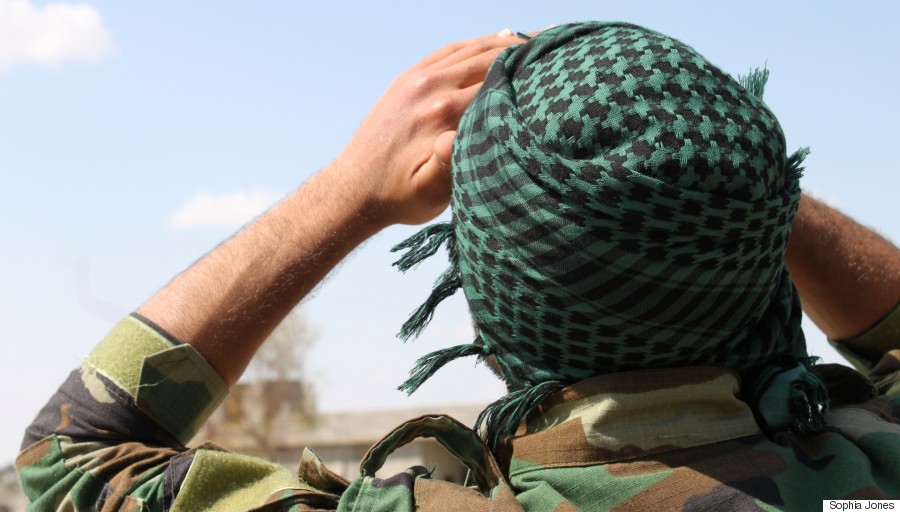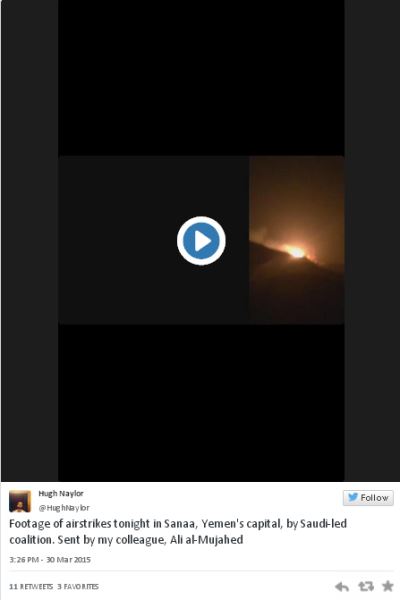BAGHDAD -- Iran-backed Shiite militiamen in Iraq say they're ready to take up arms in a country most of them have never been to: Yemen.
“We defeated ISIS in Syria, we’re defeating ISIS in Iraq, and we’ll defeat them in Yemen,” Abu Kumael, a volunteer fighter with the powerful Iran-supported Shiite militia known as the Peace Brigades, told The WorldPost Monday. “We’re not just talking. We’re physically ready to go and fight.”
In Iraq, the militias are working on the same side as U.S. forces against the self-declared Islamic State. But once the militiamen get to Yemen, they'll be fighting not for the U.S., but against the Americans -- which means that the U.S. will be battling the same forces, and in some cases the very same men, that ISIS is taking on in Iraq.

A young member of the Iran-backed Shiite militia known as the Badr Organization looks up at a drone in the sky over Tikrit on March 26.
Last week, a Saudi-led alliance began bombing Yemen’s Houthi rebels -- airstrikes that were supported with U.S. logistics and intelligence. The rebels have largely driven Yemen's government from power. The government had been backed by the U.S. because of its willingness to battle militant extremists, and to allow the U.S. to do the same within its borders. It also had the strong backing of Saudi Arabia and other Gulf nations that see Shiite Iran as their true enemy.
The Shiite Iraqis see the unfolding events in the Arabian Peninsula as an extension of their own fight in Iraq and Syria. It’s a sectarian war, they say, in which they see no choice but to defend the Houthis, adherents of the Zaidi branch of Shiite Islam.

The Yemen conflict complicates U.S. policy in the region because the Houthis have the support of Iran. That means the U.S. is fighting alongside Iran in two countries and against it in at least one other. "We finally figured out a way to fight a proxy war against ourselves," is how comedian Jon Stewart put it. "Now we're just punching ourselves in the dick."
But the previously unreported intention of the Iraqi militias to travel to Iraq and battle the U.S.-backed coalition takes the contradiction to new heights. Shiite paramilitary forces keen on fighting in Yemen say innocent Shiites are being slaughtered there by Saudi Arabia, which makes their war one and the same. On Monday, Arab coalition airstrikes killed dozens of people in a camp for those displaced in the country's north, according to the International Organization for Migration.
The White House declined to comment on the development.

A member of the Iran-backed Shiite militia known as the Badr Organization eyes a large hole in the ground caused by an IED in Tikrit on March 26.
Abu Ahmed, 33, who fights with the Iranian proxy militia Kata'ib Sayyed al-Shuhada near the northern Iraqi city of Kirkuk, where ISIS still vies for control, said men from his fighting force have already begun signing up to fight. One of the group’s leaders told the fighters that there would be a chance, very soon, to go to Yemen, according to Ahmed. He said his brother immediately added his name to the growing list.
“We’re ready, 100 percent, to go and defend the Houthis,” said 35-year-old Wissam, a militiaman with the Peace Brigades. “The battle is against the Shia. It’s a sectarian war. We’ll never forget our brothers in Yemen.”
Wissam, currently in Baghdad, said he was one of many who had already spoken to their leaders about heading to Yemen. He added that he might be able to somehow coordinate with people in Lebanon, where Iran also has a strong influence.
“We have armies waiting for the call,” said Abu Kumael. “We’re getting ready in the next few days to prepare to defend our brothers in Yemen.”
Tens of thousands of Iraqi Shiites joined forces last summer when the country’s top Shiite cleric, Grand Ayatollah Ali al-Husseini al-Sistani issued a call to arms to fight off the extremist group closing in on the capital and other major Iraqi cities. Now, Kumael said he expects the Marjaya -- Iraq’s leading religious authority -- to soon call on Iraqi Shiites to join the fight in Yemen.
While many Iraqi Shiites view the militias as heroes for taking security into their own hands when the state could not, thousands of Sunnis who insist they are being pushed out of their homes, detained and killed, say the fighters are nothing but sectarian bullies.
The U.S. has an uneasy relationship with the Shiite militias. They are one of the few solid fighting forces capable of taking on ISIS, whose reach extends close to Baghdad. But they also have until relatively recently been openly battling U.S. forces and shelling the Green Zone, home to U.S. diplomats and advisers in Baghdad. They are under varying degrees of control by the Iranian government, which also has broad sway over the Iraqi government.
Last week, U.S. officials pushed for the militias to take a backseat in operations against ISIS, while the militias claimed to be stepping aside to protest U.S. entrance into the battle.
Iran’s sway is obvious in Baghdad, where posters for Iranian-advised, paid, and armed militias adorn the city. The face of Iran’s Supreme Leader Ayatollah Ali Khamenei is seen plastered to checkpoints and billboards everywhere.
Meanwhile Iran, the U.S., and its five negotiating partners are approaching Tuesday's deadline for the political framework of an agreement to curb Iran’s nuclear program. Saudi Arabia has been skeptical of the negotiations, fearful of the geopolitical implications of U.S. rapprochement with Iran. Its government and other Arab nations over theweekend announced they would create a joint military force in the Middle East.
Sophia Jones and an Iraqi journalist reported from Baghdad. Ryan Grim and Jessica Schulberg contributed reporting from Washington.